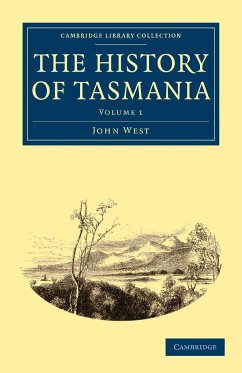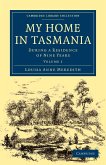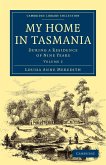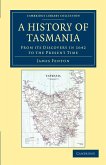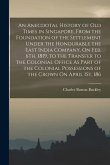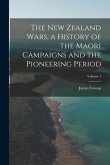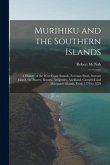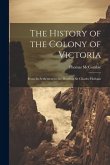John West
The History of Tasmania
John West
The History of Tasmania
- Broschiertes Buch
- Merkliste
- Auf die Merkliste
- Bewerten Bewerten
- Teilen
- Produkt teilen
- Produkterinnerung
- Produkterinnerung
- Weitere 7 Ausgaben:
- Broschiertes Buch
- Broschiertes Buch
- eBook, ePUB
- eBook, ePUB
- eBook, ePUB
- eBook, ePUB
- eBook, ePUB
A history of Tasmania by an English-born minister who fought to end its status as a penal colony.
Andere Kunden interessierten sich auch für
![My Home in Tasmania My Home in Tasmania]() Louisa Anne MeredithMy Home in Tasmania36,99 €
Louisa Anne MeredithMy Home in Tasmania36,99 €![My Home in Tasmania My Home in Tasmania]() Louisa Anne MeredithMy Home in Tasmania36,99 €
Louisa Anne MeredithMy Home in Tasmania36,99 €![A History of Tasmania A History of Tasmania]() James FentonA History of Tasmania51,99 €
James FentonA History of Tasmania51,99 €![An Anecdotal History of Old Times in Singapore, From the Foundation of the Settlement Under the Honourable the East India Company, On Feb. 6Th, 1819, An Anecdotal History of Old Times in Singapore, From the Foundation of the Settlement Under the Honourable the East India Company, On Feb. 6Th, 1819,]() Charles Burton BuckleyAn Anecdotal History of Old Times in Singapore, From the Foundation of the Settlement Under the Honourable the East India Company, On Feb. 6Th, 1819,27,99 €
Charles Burton BuckleyAn Anecdotal History of Old Times in Singapore, From the Foundation of the Settlement Under the Honourable the East India Company, On Feb. 6Th, 1819,27,99 €![The New Zealand Wars, a History of the Maori Campaigns and the Pioneering Period; Volume 1 The New Zealand Wars, a History of the Maori Campaigns and the Pioneering Period; Volume 1]() James CowanThe New Zealand Wars, a History of the Maori Campaigns and the Pioneering Period; Volume 127,99 €
James CowanThe New Zealand Wars, a History of the Maori Campaigns and the Pioneering Period; Volume 127,99 €![Murihiku and the Southern Islands: A History of the West Coast Sounds, Foveaux Strait, Stewart Island, the Snares, Bounty, Antipodes, Auckland, Campbe Murihiku and the Southern Islands: A History of the West Coast Sounds, Foveaux Strait, Stewart Island, the Snares, Bounty, Antipodes, Auckland, Campbe]() Robert McNabMurihiku and the Southern Islands: A History of the West Coast Sounds, Foveaux Strait, Stewart Island, the Snares, Bounty, Antipodes, Auckland, Campbe27,99 €
Robert McNabMurihiku and the Southern Islands: A History of the West Coast Sounds, Foveaux Strait, Stewart Island, the Snares, Bounty, Antipodes, Auckland, Campbe27,99 €![The History of the Colony of Victoria: From Its Settlement to the Death of Sir Charles Hotham The History of the Colony of Victoria: From Its Settlement to the Death of Sir Charles Hotham]() Thomas MccombieThe History of the Colony of Victoria: From Its Settlement to the Death of Sir Charles Hotham25,99 €
Thomas MccombieThe History of the Colony of Victoria: From Its Settlement to the Death of Sir Charles Hotham25,99 €-
-
-
A history of Tasmania by an English-born minister who fought to end its status as a penal colony.
Hinweis: Dieser Artikel kann nur an eine deutsche Lieferadresse ausgeliefert werden.
Hinweis: Dieser Artikel kann nur an eine deutsche Lieferadresse ausgeliefert werden.
Produktdetails
- Produktdetails
- Verlag: Cambridge University Press
- Seitenzahl: 362
- Erscheinungstermin: 11. März 2011
- Englisch
- Abmessung: 216mm x 140mm x 21mm
- Gewicht: 510g
- ISBN-13: 9781108030793
- ISBN-10: 1108030793
- Artikelnr.: 33402131
- Herstellerkennzeichnung
- Libri GmbH
- Europaallee 1
- 36244 Bad Hersfeld
- gpsr@libri.de
- Verlag: Cambridge University Press
- Seitenzahl: 362
- Erscheinungstermin: 11. März 2011
- Englisch
- Abmessung: 216mm x 140mm x 21mm
- Gewicht: 510g
- ISBN-13: 9781108030793
- ISBN-10: 1108030793
- Artikelnr.: 33402131
- Herstellerkennzeichnung
- Libri GmbH
- Europaallee 1
- 36244 Bad Hersfeld
- gpsr@libri.de
John West grew up in Santa Monica, California. He graduated from California State University in Long Beach, California, with a major in biology, a major in physical education, a minor in physical science, and a lifetime standard-teaching credential. He taught science for thirty-three years and retired in 2001. Keeping current in biology and advances in science has enabled John to give a semiscientific bent to his humor. He has also written a child's book titled Being Three and recorded a CD of original cowboy poetry. John lived six months on Bainbridge Island, Washington, and six months in Scottsdale, Arizona. He is married to Valerie and has two children and five grandsons.
Part I. Discovery: 1. Anthony Van Diemen, governor of Batavia
2. Colonel Purry's project
Part II. From 1803 go 1824: 1. Van Diemen's Land occupied
2. Hobart Town named
3. Lieutenant E. Lord acting lieutenant-governor
4. Form of colonial government
5. Lieutenant-Governor Sorrell
6. Sheep introduced
7. Whaling
8. Religious efforts
9. Bill for better administration of justice
Part III. From 1824 to 1836: 1. Lieutenant-Colonel Arthur, superintendent at Honduras
2. Rise of the Australian press
3. Van Diemen's Land Company formed
4. State of society at Hobart
5. Dispute between Jennings and Montagu
6. Grammar school
7. Bank of Van Diemen's Land
8. Liabilities of publicans
9. Endowment of emigrants with land
10. Van Diemen's Land divided into counties
11. Brisbane grants
12. Wakefield's colonization scheme
13. Bank of Australasia
14. Glorious 23rd of May!
15. Mr. W. Bryan's disagreement with Arthur
16. 'True Colonist'
17. Recall of Arthur
Part IV. From 1836 to 1843: 1. Snodgrass acting-governor
2. Difficulties respecting the churches
3. Education
4. Distillation forbidden
5. Franklin arranges probation system
Part V. From 1843 to 1847: 1. Sir William Denison meets the twelve
2. Struggle against transportation
3. London agency
4. Lord J. Russell's speech
5. The 'Australias are One'
Zoology: 1. Mammalia
2. Birds
3. Fishes
4. Reptiles
5. Insects
6. Mollusca.
2. Colonel Purry's project
Part II. From 1803 go 1824: 1. Van Diemen's Land occupied
2. Hobart Town named
3. Lieutenant E. Lord acting lieutenant-governor
4. Form of colonial government
5. Lieutenant-Governor Sorrell
6. Sheep introduced
7. Whaling
8. Religious efforts
9. Bill for better administration of justice
Part III. From 1824 to 1836: 1. Lieutenant-Colonel Arthur, superintendent at Honduras
2. Rise of the Australian press
3. Van Diemen's Land Company formed
4. State of society at Hobart
5. Dispute between Jennings and Montagu
6. Grammar school
7. Bank of Van Diemen's Land
8. Liabilities of publicans
9. Endowment of emigrants with land
10. Van Diemen's Land divided into counties
11. Brisbane grants
12. Wakefield's colonization scheme
13. Bank of Australasia
14. Glorious 23rd of May!
15. Mr. W. Bryan's disagreement with Arthur
16. 'True Colonist'
17. Recall of Arthur
Part IV. From 1836 to 1843: 1. Snodgrass acting-governor
2. Difficulties respecting the churches
3. Education
4. Distillation forbidden
5. Franklin arranges probation system
Part V. From 1843 to 1847: 1. Sir William Denison meets the twelve
2. Struggle against transportation
3. London agency
4. Lord J. Russell's speech
5. The 'Australias are One'
Zoology: 1. Mammalia
2. Birds
3. Fishes
4. Reptiles
5. Insects
6. Mollusca.
Part I. Discovery: 1. Anthony Van Diemen, governor of Batavia
2. Colonel Purry's project
Part II. From 1803 go 1824: 1. Van Diemen's Land occupied
2. Hobart Town named
3. Lieutenant E. Lord acting lieutenant-governor
4. Form of colonial government
5. Lieutenant-Governor Sorrell
6. Sheep introduced
7. Whaling
8. Religious efforts
9. Bill for better administration of justice
Part III. From 1824 to 1836: 1. Lieutenant-Colonel Arthur, superintendent at Honduras
2. Rise of the Australian press
3. Van Diemen's Land Company formed
4. State of society at Hobart
5. Dispute between Jennings and Montagu
6. Grammar school
7. Bank of Van Diemen's Land
8. Liabilities of publicans
9. Endowment of emigrants with land
10. Van Diemen's Land divided into counties
11. Brisbane grants
12. Wakefield's colonization scheme
13. Bank of Australasia
14. Glorious 23rd of May!
15. Mr. W. Bryan's disagreement with Arthur
16. 'True Colonist'
17. Recall of Arthur
Part IV. From 1836 to 1843: 1. Snodgrass acting-governor
2. Difficulties respecting the churches
3. Education
4. Distillation forbidden
5. Franklin arranges probation system
Part V. From 1843 to 1847: 1. Sir William Denison meets the twelve
2. Struggle against transportation
3. London agency
4. Lord J. Russell's speech
5. The 'Australias are One'
Zoology: 1. Mammalia
2. Birds
3. Fishes
4. Reptiles
5. Insects
6. Mollusca.
2. Colonel Purry's project
Part II. From 1803 go 1824: 1. Van Diemen's Land occupied
2. Hobart Town named
3. Lieutenant E. Lord acting lieutenant-governor
4. Form of colonial government
5. Lieutenant-Governor Sorrell
6. Sheep introduced
7. Whaling
8. Religious efforts
9. Bill for better administration of justice
Part III. From 1824 to 1836: 1. Lieutenant-Colonel Arthur, superintendent at Honduras
2. Rise of the Australian press
3. Van Diemen's Land Company formed
4. State of society at Hobart
5. Dispute between Jennings and Montagu
6. Grammar school
7. Bank of Van Diemen's Land
8. Liabilities of publicans
9. Endowment of emigrants with land
10. Van Diemen's Land divided into counties
11. Brisbane grants
12. Wakefield's colonization scheme
13. Bank of Australasia
14. Glorious 23rd of May!
15. Mr. W. Bryan's disagreement with Arthur
16. 'True Colonist'
17. Recall of Arthur
Part IV. From 1836 to 1843: 1. Snodgrass acting-governor
2. Difficulties respecting the churches
3. Education
4. Distillation forbidden
5. Franklin arranges probation system
Part V. From 1843 to 1847: 1. Sir William Denison meets the twelve
2. Struggle against transportation
3. London agency
4. Lord J. Russell's speech
5. The 'Australias are One'
Zoology: 1. Mammalia
2. Birds
3. Fishes
4. Reptiles
5. Insects
6. Mollusca.

